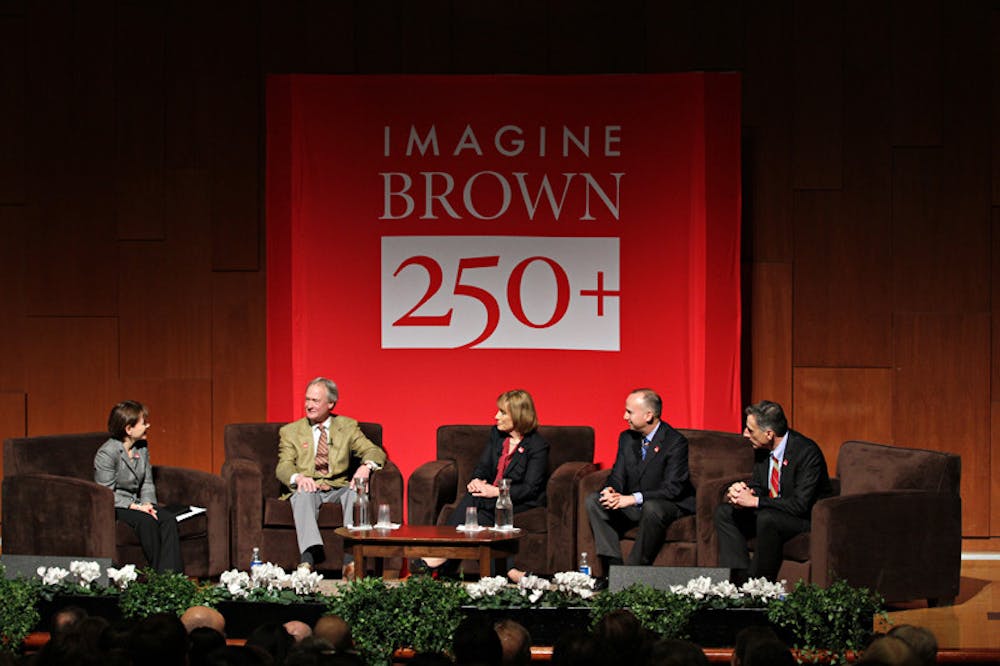The governors of Rhode Island, New Hampshire, Delaware and Vermont — three of whom are alums — joined Wendy Schiller, associate professor of political science and public policy, at the first of five events Saturday that together composed the President’s Colloquium on the Virtues of a Liberal Education. Each of the governors reflected briefly on their experiences leading a state before transitioning into a conversation on the Affordable Care Act.
Schiller, who moderated the discussion between the panelists, introduced the four guests — Rhode Island Gov. Lincoln Chafee ’75 P’14 P’17, New Hampshire Gov. Maggie Hassan ’80 P’15, Delaware Gov. Jack Markell ’82 and Vermont Gov. Peter Shumlin P’14.
The University invited Louisiana Gov. Bobby Jindal ’91.5 to participate in the panel, but he declined to attend, Schiller said.
Chafee noted that he remembered the University’s 200th anniversary in 1964, which featured President Lyndon Johnson. Chafee said he thought the 1964 campaign between Barry Goldwater, who had voted against the Civil Rights Act, and Johnson was representative of today’s partisan divide.
The “fervency” and uncharitable nature that characterizes politics today is especially evident in the Tea Party, which “doesn’t care sometimes about winning the general election,” Chafee said. “It’s more about” ideology.
Hassan described the challenges and rewards of serving as the governor of a “purple state” that has a variety of political factions and favors bipartisan cooperation.
She described how the recession preceding the 2010 midterm elections resulted in a wave of Tea Party candidates being voted into office and “dominat(ing) the legislature.”
“The behavior of the tea party … really bothered our people across party lines,” Hassan said, adding that between 2010 and 2012, the Tea Party secured the passage of laws that barred New Hampshire from establishing a state-run health exchange as part of the Affordable Care Act or accepting federal money to help implement the law.
Markell spoke of a shifting political landscape in Delaware that favors Democrats. When he was first elected to public office in 1998, only three of the nine statewide seats were held by Democrats — a number that today has grown to eight. “There’s a good chance that a year from now, we’ll control nine out of the nine,” he said.
Markell drew a sharp distinction between the roles of state and national politicians. “People really don’t care that much about partisan politics at a statewide level,” he said, adding that governors are evaluated on criteria such as job growth, education quality and responsible spending, unlike politicians in Washington who are often judged by the quality of their rhetoric. Markell said he lamented that so much of national politics “is about scoring points against the other party.”
“People see (governors) as problem-solvers,” Markell said.
Shumlin noted that the party affiliation of Vermont’s governorship has changed “every single time we’ve switched governors since 1963.” Though it is often perceived as a solidly Democratic, progressive state, “when it comes to governors, folks use a different standard,” allowing for the election of moderate Republicans who are willing to work with a liberal-leaning legislature, he said.
“One of the beauties of Vermont is that our Republicans don’t drink too much tea,” Shumlin quipped, adding that they tend to be fiscally responsible and socially open-minded. By working together, the government in Vermont is “actually solving the problems that they should be solving in Washington,” Shumlin said, adding that states around the country are serving as “laboratories for change.”
The governors then discussed national health policy and the ongoing implementation of the Affordable Care Act.
Chafee voiced approval of the new law and its effects. “Anything is better than the status quo,” he said, adding that he is confident that policymakers will “iron out the glitches.”
Markell dismissed the notion that President Obama’s signature law is the most important part of health care reform in the country. He said the most innovative work on health care is taking place in states that are moving “away from frankly what is not really a health care system — it’s a sick care system.”
Acknowledging the complicated nature of America’s health care system, Markell said there needs to be more of an emphasis on preventative treatment, so that people can avoid trips to the emergency room — the most expensive place for treatment.
Shumlin added that the current system is not only detrimental to patients but also “a prescription for economic disaster.”
After the panelists spoke about health care, Schiller opened the floor for questions, though the remaining time allowed for just two.
Once audience member asked if the governors could offer advice to people from states such as Wisconsin and New Jersey “on how we might help bridge the gap between partisanship.”
“There’s nothing wrong with conflict,” Markell responded, noting that as long as the discussion is centered on ideas, and is not focused on attacking the “personalities” of other people, then disagreement can be constructive.
Hassan said, “It’s what you do after you argue that really matters,” quoting Robert Frost’s advice that “the best way out is always through.”
Another attendee asked what role the “political culture of town meeting(s),” which has historically characterized New England states where three of the panelists hold office, has played in their abilities to overcome partisanship.
Hassan said she thinks the culture of town meetings has been important in her experience as governor of New Hampshire because “we are used to arguing with each other and then coming to agreements.” Though there may be differences in the solutions proposed by various factions, people generally share similar values, vision and purpose, she added.
Democracy was not designed to handle the influence of corporate money and lobbyist groups, which crowd out citizens’ voices, Shumlin said, adding that meeting with community members has proven helpful in overcoming these forces. “There’s supposed to be a dialogue, and a conversation,” he said.

ADVERTISEMENT




